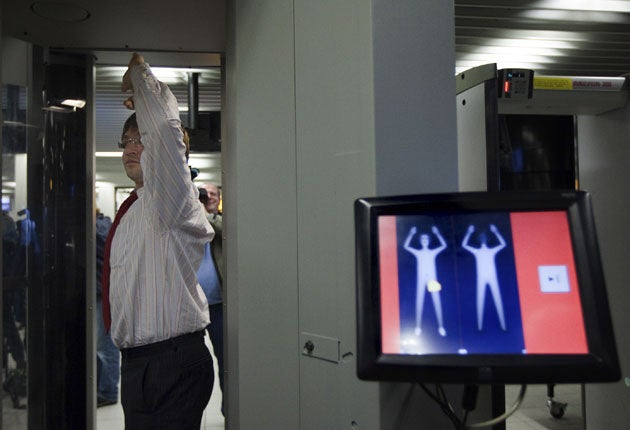Airports face mounting pressure to introduce hi-tech scanners

The ease with which Umar Farouk Abdulmutallab was able to smuggle an incendiary device through security checks in two separate countries has increased pressure on airport operators to introduce scanners to detect what lies under a person's clothing.
State of the art "millimetre wave" scanners and "backscatter x-ray" machines use extremely high frequency radio waves or electromagnetic radiation to see through layers of clothing, and can help spot items which ordinary metal detectors might miss. But governments have been reluctant to adopt the machines because they are 10 times more expensive than metal detectors and raise privacy issues.
At Amsterdam's Schiphol airport, where Abdulmutallab changed from his Lagos flight to one destined for Detroit, 15-millimetre wave scanners are already in operation. But they can only be used by people who volunteer to be searched, because the images they produce show the person naked.
Security heads know that any attempt to make the use of such scanners compulsory would upset many travellers. Germany balked at introducing the scanners last year after a public backlash. But a number of governments, led by the US, have started trials in key airports and train stations.
The Home Secretary, Alan Johnson, has suggested that Britain should be prepared to place the scanners at all of its airports. But after a four-year trial of the machines at Heathrow between April 2004 and July 2008, the airport decided not to install the machines.
A spokesperson last night declined to elaborate on the reasons behind this decision, but it is thought that Heathrow favours using machines that can detect traces of explosive chemicals rather than penetrate clothing.
Security companies that make the machines have seen their stocks rise considerably this week. Some of the smaller firms, such as ICX Technologies and OSI Systems, have seen their shares rise by as much as 10 per cent.
But experts say that although the technology can help to tighten security, it cannot eliminate risks altogether.
When Abdulmutallab checked in for his flight at Lagos, he was carrying only a shoulder bag for a long-haul flight across three continents. Had an alert check-in desk clerk asked why a lone man would want to travel to America without any baggage, the young Nigerian might not have made it onto a plane in the first place.
Join our commenting forum
Join thought-provoking conversations, follow other Independent readers and see their replies
Comments
Bookmark popover
Removed from bookmarks